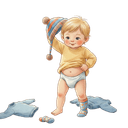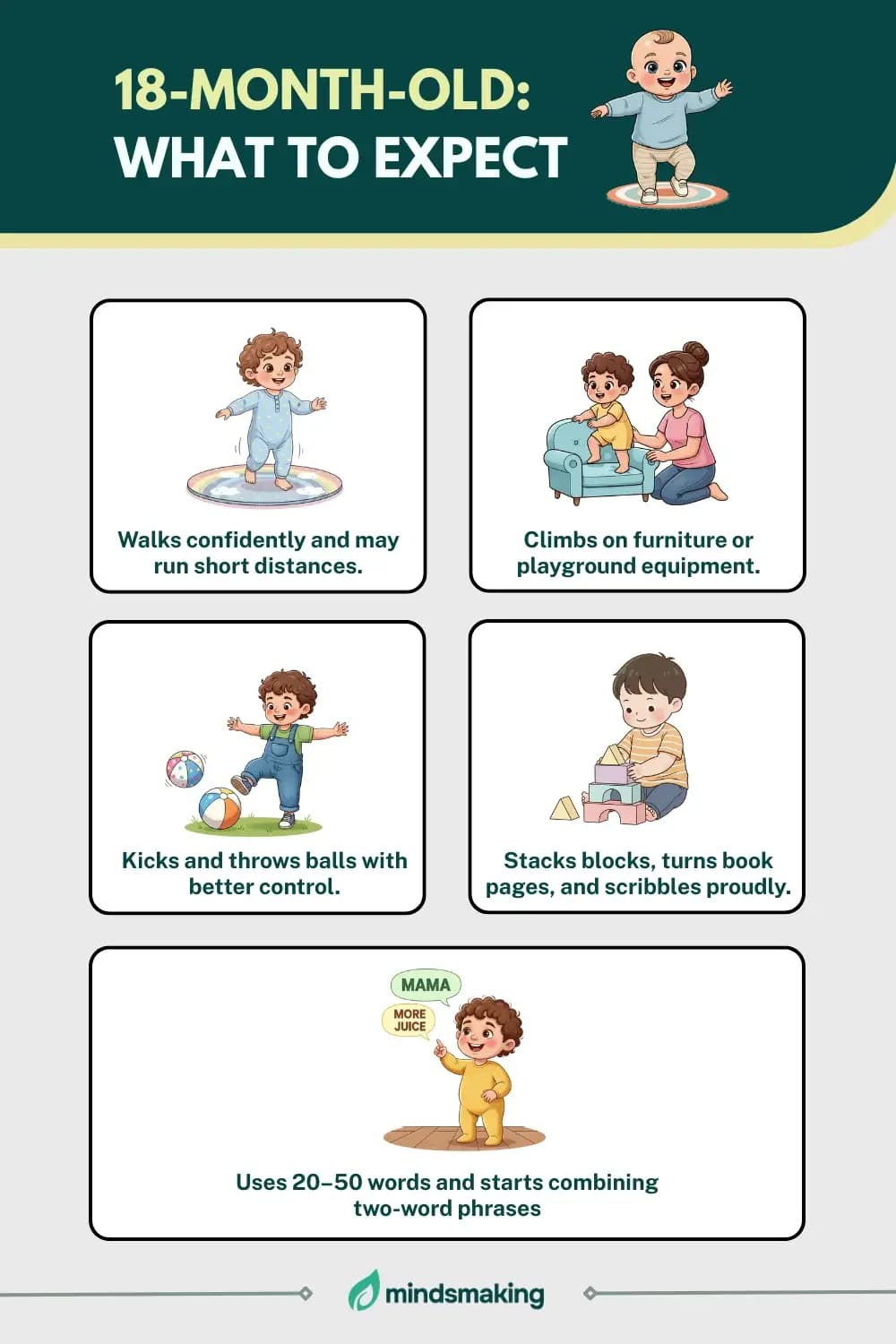18-Month-Old Toddler Development and What to Expect

Written by Mindsmaking Medical Writer
Fact Checked by Mindsmaking Professionals
15th, December, 2025
If you’ve ever caught your toddler trying to act like a little adult, don’t be surprised, it is completely normal around the 18-month mark. But there’s still so much more going on beneath the surface when it comes to their development.
By now, your 18-month-old is showing a lot of confidence, curiosity, and independence. They are no longer just walking and running, they are climbing, exploring, and testing their limits, even when some plays are clearly beyond their reach. It is all part of their exciting 18-month milestones.
If you have been following their journey since the 17-month-old toddler development stage, you have probably noticed how much more expressive they have become. They now use gestures, words, and facial expressions to communicate, and they cannot seem to stay still for long. Your baby is endlessly curious, eager to learn, and determined to do things their own way.
This stage comes with a mix of joy and challenges. You laugh at their progress one minute and, the next, find yourself shouting when they push too far. Honestly, it can feel like a roller coaster but it is completely normal. When it comes to 18-month-old toddler development and what to expect, the best part is watching your baby grow into their own little person.
Key Takeaways
At 18 months, your toddler is mastering movement, balance, and coordination by walking confidently, climbing everything in sight, and proudly using their hands to explore, play, and feed themselves with growing independence.
Your 18-month-old is finding their voice, combining words, gestures, and songs to express needs and emotions, while rapidly expanding vocabulary and understanding of the world around them.
Your 18-month-old is a curious little thinker, exploring cause and effect, solving problems, and engaging in pretend play while building memory, understanding patterns, and learning through repetition.
By 18 months, toddlers experience a wide range of emotions, show early empathy, assert independence, and form strong attachments, all while learning to express themselves and connect with others.
Toddlers at 18 months need 11–14 hours of sleep and are exploring new foods and textures, showing growing independence at mealtime while occasional disruptions and picky eating remain normal.
Supporting your 18-month-old’s development is simple through play, including active exploration, fine motor activities, pretend play, reading, songs, routines, and gentle guidance to build skills, confidence, and emotional awareness.
Consult a pediatrician if your 18-month-old shows delays in walking, speaking, social interaction, emotional expression, sleep or feeding, or loses previously learned skills.
Physical and Motor Development
At 18 months, your toddler has discovered the joy of movement, and you have probably discovered how fast they can disappear when you blink. This stage is all about refining coordination, building strength, and showing off every new move they have mastered. Here is what to expect during your toddler's 18-month-old mark:
Physical and Motor Development

Walking steadily and beginning to run short distances
Gone are the wobbly steps of earlier months, especially those of the 12-month-old baby's development. Your toddler now walks with confidence, sometimes even runs, though stopping gracefully might still be a work in progress. One minute, they are beside you and the next, they are halfway across the room chasing a ball or a pet.

Climbing onto furniture or playground structures
No chair, couch, or step is safe anymore. With a growing balance, your little one climbs anything that looks like a mini mountain. It’s equal parts thrilling and nerve-racking watching them explore as their courage has no limits, but thankfully, your reflexes are improving too

Kicking and throwing balls
Their coordination is getting better, and they are starting to understand the fun of play. Whether it is kicking a soft ball across the floor or tossing toys instead of handing them over, they are learning control.

Using push and pull toys for active play
These toys are their new best friends. From dragging a toy train around the house to pushing a mini cart like a proud shopper, your toddler is strengthening muscles while having a blast.

Improving hand-eye coordination
You will notice their little hands getting more precise. They can stack four or more blocks, turn book pages, and even scribble circles with a crayonproudly. These small victories mark big leaps in fine motor development.

Improving utensil use
Mealtime is no longer just about eating, it is a full-on performance. Your toddler will try using forks and open cups, often with more spills than success, but that is how they learn. Every messy meal is a step toward independence.

Beginning to remove simple clothing items
Your toddler is learning to undress themselves, often at the most unexpected times. Whether it is a hat, socks, or shirt, they just want to do it on their own. It is both funny and freeing; a clear sign that they are gaining confidence in doing things “all by myself.”
Language Development
Your 18-month-old is finding their voice and they are not afraid to use it. Those babbles you used to hear are slowly turning into real words, and suddenly, your home feels livelier. Every “mama,” or “dada,” is a proud reminder that your baby is learning to communicate in their own adorable way. Here is how speech development looks like for your baby at 18 months:
Vocabulary expansion: By now, your toddler’s vocabulary may include around 20 to 50 words, though some use fewer and others surprise you with more. Do not worry if your little one is not talking nonstop yet, they understand a lot more than they say.
Combining two words: You might start hearing short phrases like “more milk” or “mama go.” It is a sweet milestone that shows they are learning how words connect to express what they want, and what they do not want.
Understanding questions and instructions: Simple phrases such as “Where’s your ball?” or “Come here” suddenly make sense to them. Whether they respond with a proud grin or pretend not to hear you, it is a sign of growing comprehension.
Using gestures with speech: Your toddler now points, waves, or shakes their head to make sure you get the message. Words and gestures go hand in hand to help them express needs and emotions more clearly.
Naming familiar people and objects: From calling “mama” across the room to pointing out “dog,” “car,” or their favorite toy, your child is connecting names to the world around them. It is a beautiful sign that their memory and understanding are developing.
Enjoying songs and rhymes: Music time has never been more fun. Your little one loves to clap, dance, and imitate animal or vehicle sounds. Whether it is “moo,” “beep,” or “twinkle,” every sound is a tiny step toward better language and listening skills.
Cognitive Development
Your 18-month-old is turning into a little thinker, and now, they are curious, observant, and endlessly fascinated by how the world works. You will catch them experimenting, imitating, and testing everything around them. Their growing brain is busy connecting dots, building memories, and making sense of events. Here is what cognitive development looks like at this stage:
Exploring cause and effect: If you ever noticed how your toddler drops the same toy over and over just to watch what happens, it is learning in progress. They are beginning to understand that every action brings a reaction, and this discovery is as exciting to them as a new toy.
Improved memory: Your child can now remember routines, recognize familiar faces, and even recall where their favorite teddy is hiding. This growing memory makes them feel more secure and confident. Just do not be surprised when they remind you it is snack time.
Pretend play: When you see your toddler feed dolls, chat on a toy phone, or stir imaginary soup, it is their imagination blooming. Pretend play helps them understand real-life situations and express emotions, even if their “baby doll dinner” looks a bit undercooked.
Matching and sorting: Shapes, colors, and objects are beginning to make sense. Your toddler might group things that look alike or stack blocks by color. These small activities show an early understanding of patterns and organization.
Curiosity and problem-solving: Nothing is safe from an 18-month-old’s curiosity. They are figuring out how things open, close, and work, using trial and error to learn about their surroundings. Imitating adults is also part of this discovery process, so expect to find them “helping” with chores.
Love for repetition: Reading the same book five times in a row is part of toddlerhood. Repetition builds confidence and understanding. It also gives your little one a sense of comfort and mastery over familiar things.
Read This Next
No posts available
Social and Emotional Development
Your 18-month-old is feeling all there is to feel, and they are not shy about showing it. One moment, they are laughing and clapping with joy the next, they are crying. These emotional swings are completely normal. At this stage, toddlers are learning to recognize and express a wide range of emotions like happiness, frustration, pride, and even confusion. They are also developing stronger attachments to the people they love most. Expect lots of hugs, cuddles, and moments when they want you right beside them because to your little one, you are still the safest place in the world.
You may also notice early signs of emotional development, like patting a friend’s back, offering a favorite toy, or looking sad when someone else cries. These sweet gestures show your toddler’s emotional awareness is blossoming. Alongside that tenderness comes a growing desire for independence and the famous “No!” phase. Your toddler is testing limits, exploring boundaries, and discovering that they can make their own choices. It is a huge milestone in building confidence and self-identity.
Of course, big feelings in a small body can lead to the occasional meltdown. Tantrums happen when emotions overwhelm them or words fall short. It is all part of learning self-control. Try to stay calm, offer comfort, and remember that this too shall pass. Your toddler is also starting to show strong preferences for certain people, toys, and routines, finding comfort in the familiar. Beneath the whirlwind of emotions is a little person learning how to love, express, and connect.
Sleep and Feeding Patterns
By 18 months, sleep and food can feel like a balancing act. Some days are smooth, other days are completely unpredictable. Your toddler typically needs around 11–14 hours of sleep, including one afternoon nap, but that does not mean bedtime is always peaceful.
Developmental leaps or teething can stir things up, leaving you with midnight cuddles or extra-long rocking sessions. Do not worry, these disruptions are temporary, and before long, your little one will settle back into routine.
When it comes to meals, your toddler is becoming quite the explorer. They are eating three meals and two snacks a day, trying out new textures, flavors, and maybe even showing off their fork or open cup skills. You will notice bursts of independence as they insist on feeding themselves, even if half the food ends up everywhere but their mouth.
Honestly, picky eating might make an appearance. One day they love bananas; the next, they act like they have never seen one before. Do not worry, it is all part of growing up. Keep mealtimes calm, fun, and family-centered. Eating together helps model healthy habits and reassures your toddler that food is something to enjoy, not battle over.
Activities to Support Development
At 18 months, play is more than fun for your baby. It is how your toddler learns, grows, and understands the world around them. Every playful moment builds confidence, strength, and imagination. A lot of activities can support your toddler’s development without stress.
- Give your toddler plenty of safe space to climb, run, and explore both indoors and outdoors, as this helps them build coordination and balance.
- Encourage fine motor play such as stacking blocks, nesting cups, drawing, and sorting to strengthen hand-eye coordination.
- Read daily and label actions, objects, and emotions to boost vocabulary and understanding.
- Offer pretend-play materials like toy kitchens, dolls, and blocks to spark creativity and imagination.
- Sing songs with motions to improve memory, rhythm, and coordination while making learning fun.
- Practice simple routines like cleaning up toys or washing hands to build predictability and independence.
- Validate emotions with calm responses to help your toddler develop emotional awareness and self-regulation.
When to Talk to a Pediatrician
Every child develops in their own unique way, but sometimes certain signs may suggest it is worth checking in with your pediatrician. If something feels off or you notice signs of developmental delays, it is best to check in with your pediatrician.
- Not walking independently or often losing balance.
- Speaking fewer than 6–10 words or not following simple directions.
- Showing little interest in people, play, or surroundings.
- Rarely expressing emotion or not imitating familiar behaviors.
- Having ongoing sleep or feeding difficulties.
- Losing skills they once had.
A Word from Mindsmaking
At 18 months, your toddler is bursting with personality, curiosity, and newfound independence. Every day brings something new, whether it is a word, a dance move, or a determined decision to do things on their own. Celebrate these moments, even the messy ones, because they are proof of just how far your little one has come.
Remember, every child develops at their own pace. What matters most is your love, patience, and willingness to let them safely explore the world in their own way. Keep cheering them on. You are helping them grow into confident, curious, and capable little humans.


Was this article helpful?
How many stars are you giving this article?
Leave a comment
Your email address will not be published.